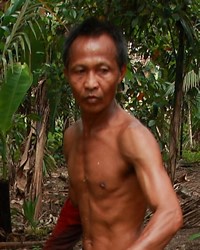Duano, Orang Kuala in Malaysia

Photo Source:
Copyrighted © 2026
Fadli Suandi - Shutterstock All rights reserved. Used with permission |
Send Joshua Project a map of this people group.
|
| People Name: | Duano, Orang Kuala |
| Country: | Malaysia |
| 10/40 Window: | Yes |
| Population: | 5,500 |
| World Population: | 26,500 |
| Primary Language: | Duano |
| Primary Religion: | Islam |
| Christian Adherents: | 0.00 % |
| Evangelicals: | 0.00 % |
| Scripture: | Translation Started |
| Ministry Resources: | No |
| Jesus Film: | No |
| Audio Recordings: | No |
| People Cluster: | Borneo-Kalimantan |
| Affinity Bloc: | Malay Peoples |
| Progress Level: |
|
Introduction / History
The Orang Kuala, also known as Duano, are one of the nineteen Orang Asli people groups living in Peninsular Malaysia. They come under the Aboriginal Malay (officially and administratively called Proto-Malay) subgroup.
Orang Kuala means "People of the River Mouth," but the Orang Kuala call themselves Duano. Some Orang Kuala may also use the term Desin Dolaq, which means "People of the Sea" (or Orang Laut in the Malay language). Their ancestors were Muslim immigrants from the coasts of southern Sumatra and the Riau-Lingga archipelago in Indonesia.
The Orang Kuala live mostly in the villages located near the river mouths of the Batu Pahat, and Pontian districts of Johor.
What Are Their Lives Like?
The Orang Kuala are admittedly peaceful folk. They are not particularly attracted to technology, and only a small percentage completes their secondary education. In the past, they were boat-dwelling sea nomads, and specialized in sea fishing as well as searching and hunting for food on seashore. Today, most of the Orang Kuala make their living by fishing. They use different types of traps ranging from traditional to modern. In addition to fishing, small-scale farming and plantation work are important occupations for the Orang Kuala. For the most part, they specialize in harvesting the produce of the sea, shore, and mangroves for their own consumption and for trade. In at least one village, some are recognized for being quite skilled in restoring and selling second-hand furniture. They have adopted many aspects of Malay culture and lifestyle. However, racial prejudice by neighboring ethnic groups has caused some of the Orang Kuala to feel ashamed of their ethnic origin. Nevertheless, most remain proud of their origin. This is evident as other ethnic groups living in the same area are better off economically than most of the Orang Kuala.
What Are Their Beliefs?
The Orang Kuala converted to Islam during the 19th century, yet many orient their daily personal and communal lives toward traditional animistic practices. For example, they believe that failure to respect the environment - the abode of the spirits (hantu) - results in illness, conflict, and death. A fisherman who dares to cast a net during the rainy season without performing the prescribed ritual inevitably suffers. The only cure lies in exorcism and appeasement of the spirits.
Like many Asian Muslims, they have retained many of their pre-Islamic religious beliefs and rituals. Customs and traditions have been harmonized with Islamic law. To the Orang Kuala the world is full of environmental spirits that cause either sickness or good fortune. Many of them still believe in evil spirits. They also believe that religious leaders, dwarfs, and traditional "medicine men" possess supernatural powers.
What Are Their Needs?
Educational and economic development is spreading throughout the land of Malaysia. Like many of the other Orang Asli groups, however, the Orang Kuala are lagging behind because they are not attracted to education or technology.
Prayer Points
Pray that local believers will relate and respond to the needs of these people.
Ask the Creator to give believers wisdom who are willing to sacrifice time and effort to help the Orang Kuala.